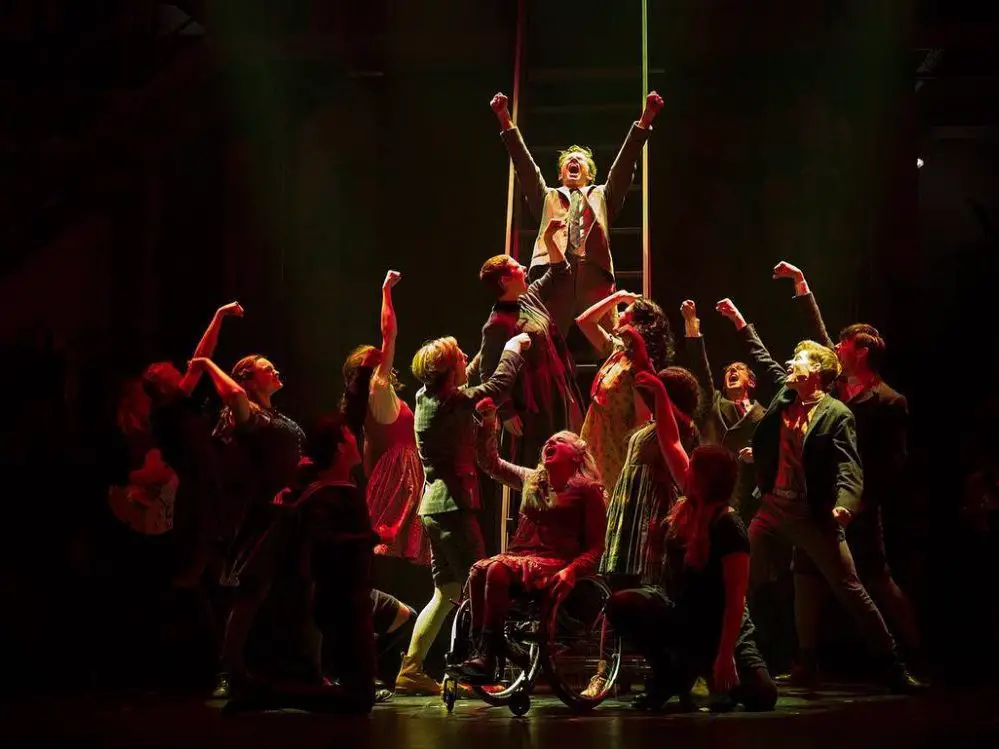Musicals can be pretty polarizing. It seems like you either love them or hate them, with no in between. When you think of a musical, what do you envision? Maybe you think of fluttering jazz hands waving through the air and dancers circling around one another while singing an upbeat show tune under bright, flashing lights.
While that type of show is still very much alive and well today, musicals have gone down another storytelling route. At the heart of many musicals are messages about mental health, social norms, LGBTQ+ issues and more. Some shows juxtapose serious, melancholy songs with upbeat dance numbers, and others leave audiences feeling emotional as a character sings, standing or sitting still.
Here are five musicals that have a deep message and lesson along with the music.
1. “Dear Evan Hansen”
A few of the main topics in “Dear Evan Hansen” are anxiety, depression, suicide and grief. We follow awkward Evan Hansen from his attempt to make friends to seeing how far a lie can spread. The message in this one is pretty obvious from the jump, but the show does an excellent job of depicting multiple struggles with mental illness.
“Dear Evan Hansen” offers a look at how mental illness can often go unnoticed and how much of an impact it can have on a person. The musical depicts these struggles in a relatable way. It takes an average high school-aged boy and shows how his not-so-average struggle with anxiety has an effect on everyone around him.
https://www.instagram.com/p/B_AhtePgsnB/?utm_source=ig_web_copy_link
2. “Fun Home”
“Fun Home” is based on Alison Bechdel’s memoir of the same name, and it follows her as she writes about her life. In a series of flashbacks, the musical shows Bechdel’s journey of self-discovery.
She deals with a tumultuous family relationship throughout the musical, but one of the biggest moments in “Fun Home” is Alison’s discovery and acceptance that she is a lesbian. Before she happily discovers this, we watch her reconsider and briefly hesitate to accept her feelings toward a woman.
An important aspect of this show is watching a person come to terms with her sexuality, questioning if she should tell her family and the potential for either rejection or acceptance.
You never know if an audience member may be dealing with a similar situation, so it’s always comforting to have a relatable character to help make sense of an issue.
3. “Next to Normal”
“Next to Normal” follows a woman who tries to balance her severe mental illness with her life and family. It doesn’t only depict how the illness affects her, but how it affects her family as well. Along with the main plot, audiences watch characters deal with depression, grief, drugs and other similar issues.
“Next to Normal” is important because it depicts mental illness accurately, and it attempts to fight the stigma of bipolar disorder. It doesn’t automatically rely on the very real extremes of bipolar, but presents little anxious behaviors that seem to be brushed off as insignificant symptoms. The topics in the show probably aren’t something you would associate with a musical, but it is executed well.
4. “Spring Awakening”
“Spring Awakening” is based on the 1891 play of the same name. If you’re not familiar, let’s just say there’s a lot to unpack here. The music ranges from active, angsty, upbeat rock numbers to slow, somber songs.
Both acts of the musical bring up multiple subjects, ranging from puberty, sex, LGBTQ+ relationships, mental health, loss, abuse and even more, but that’ll lead to spoiler alert territory. It may seem like the listed topics wouldn’t automatically carry a significant message, but the way the show and songs are written makes that happen.
The characters are all 19th century adolescent children who don’t know how to deal with the issues they’re presented with, which seems to hit everyone a little differently.
Those who have seen “Spring Awakening” have a lot to take away with them, and each character or storyline may speak to each person in a different way. It’s a heartbreaking story that conveys the importance of acceptance.
5. “Hamilton”
Yes, “Hamilton.” The show that’s incredibly hard to get tickets to because it seems like everyone and their next-door neighbor is jamming along to this show about the Founding Fathers. I’m including “Hamilton” on this list, not necessarily because of a lesson within the musical, but because of how the production impacted theater as a whole.
When you think of Alexander Hamilton, surely the last thing you associate him with is hip-hop. Along with that paradoxical element to the show, the original Broadway cast and those that came after their departure continue to defy the norms usually displayed on Broadway.
The cast consists largely of people of color, inserted as prominent figures at a time in history when they were facing incredible oppression and discrimination. If not for the lasting impression it has, check it out for the memorable songs and premise it offers.
https://www.instagram.com/p/B-7Qi8MBMj4/?utm_source=ig_web_copy_link
You can certainly find a lesson in anything without trying very hard, but through their songs and plots, the lesson is inherent in the few listed musicals. These shows offer a sense of comfort and understanding that people may not always be able to count on in their lives, and the musicals become a type of support system.
They address important topics and put feelings into words for their viewers; these musicals let their audience know they’re not alone. Shows have started normalizing topics that we may expect to see in regular plays, but not musical theater. Integrating these topics into more mainstream mediums is always a step in the right direction.
The fact that these shows are able to articulate these messages and lessons through their music shows how powerful music can be. And honestly, what better way to take in a message than by getting some pretty amazing songs stuck in your head?

















